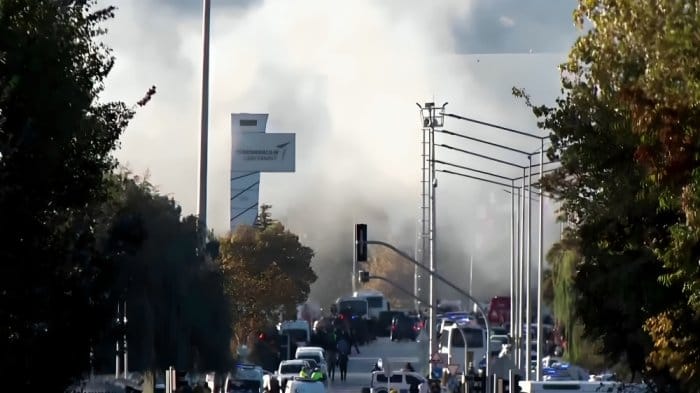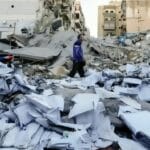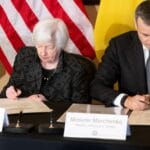Recently, Turkey launched powerful air strikes against Kurdish targets in northern Iraq and Syria. The country attacked in retaliation for a massive attack against one of its major state aerospace facilities. On Wednesday, the terrorist assault took place at Turkish Aerospace Industries (TAI), an area near Ankara, leaving five people dead and injuring nearly two dozen more.

Turkey’s Defence Ministry said its air forces had bombarded 32 different targets associated with the Kurdistan Workers’ Party (PKK), a militant group that has conflicted with Turkey’s government since the mid-1980s. The PKK has been declared a terrorist organization by Turkey, the US, the EU, and many other nations. Hitting other so-called “terrorist elements” was also part of the raids, the Turkish military said.
Turkey is highly convinced that the PKK was responsible for this recent bomb attack at the TAI facility. The facility is one of Turkey’s main defense industrial sites as it develops and manufactures aircraft and drones, satellites, and several other military pieces of equipment. Turkey’s interior minister, Ali Yerlikaya, said that the attack included the use of bombs and gunfire. The Turkish state-run news agency, Anadolu, reported that two terrorists involved were neutralized on the spot by Turkish special operation forces.
President Recep Tayyip Erdoğan responded with condemnation when addressing the BRICS summit in Russia over the attack, terming it heinous. In my opinion, this response from Erdoğan will find its solidification on both domestic and international bases, especially considering the weariness that the Turkish public feels concerning the continued terrorist threats. The PKK strikes continue a long-standing campaign against the group that for the last forty years has conducted varied attacks and insurgencies against Turkey.
Türk savunma sanayisinin lokomotif kuruluşlarından olan TUSAŞ’a yönelik düzenlenen terör eylemi; ülkemizin bekasını, milletimizin huzurunu ve “Tam Bağımsız Türkiye” idealimizin timsali olan savunma atılımlarımızı hedef alan alçakça bir saldırıdır.
Terör eyleminin ilk anından…
— Recep Tayyip Erdoğan (@RTErdogan) October 23, 2024One day before the attack, this ongoing conflict was jolted by an interesting turn of events. One of Erdoğan’s nationalist allies, Devlet Bahçeli, made a rather unusual offer. Abdullah Öcalan, the imprisoned leader of the PKK, was invited to address the Turkish parliament if he would agree to dissolve the PKK and stop its operations. While not serious, at least reportedly, or could lead to any real breakthrough, it was indeed widely reported in Turkey’s media. I do not think such a proposal would ripen, the PKK has been locked in this conflict for so long that it seems unlikely that such a public and political move could persuade them to disband.
READ MORE | Terror Attack in Turkey Claims Lives and Leaves Many Injured
From another angle, Turkey has been in an emergency state with Kurdish forces not only within its borders but also in northern Iraq and Syria, where PKK-linked groups operate. These regions become most targeted for Turkish air and special forces operations. In fact, over the years, terrorist attacks have run rampant in Turkey. Some have been claimed by PKK while others came from groups like ISIS or far-left militants. For instance, from 2015 until 2017, Turkey witnessed a strong wave of terror where bombings hit Ankara, the capital city, and other towns. They also suffered the attempted coup of 2016, which scarred the country by damaging the parliament building itself.
In a beautiful irony, after the latest attack at TAI, Turkish authorities took some quick steps to restrict the flow of information. They imposed broadcasting bans regarding images of the attack and restrained social media platforms such as X (formerly Twitter), Instagram, Facebook, and so on. This is not the first time Turkey restrained access to information in such scenarios, especially about terror attacks and elections. Speaking about these acts, Yaman Akdeniz, co-founder of the Turkish Freedom of Expression Association, pointed out that communication rights are undoubtedly being seriously violated. I agree with Akdeniz on this matter. Deprivation of access to the internet and social networks will deprive people of much-needed information so healthy in the long run.
I just spoke with w/ @RTErdogan about the terror attack in #Ankara. My message was clear: #NATO stands with #Türkiye
— Mark Rutte (@SecGenNATO) October 23, 2024Globally, this attack and Turkey’s response did grab everyone’s attention. At the BRICS summit, in a meeting with Erdoğan, Russian President Vladimir Putin spoke his condolences. NATO’s secretary-general, Mark Rutte, too showed solidarity with Turkey by pronouncing that NATO stands with the country. This responsiveness by both Russia and NATO testifies to Turkey’s crucial geopolitical position but also points out how Turkey is caught between two opposing worlds most of the time.
All things considered, I believe this spate of violence reflects the deep-running nature of problems in Turkey, particularly if it regards matters dealing with PKK and other militant organizations against stability in the country. This air strike may mean the Turkish state finally gets to show off its muscles, but there seems no endgame for these issues. Having gone on this way for such a long time with so well-entrenched politics around the matter, the prospects of a peaceful end to the issue remain distant.
Minutes by M31GlobalNews






